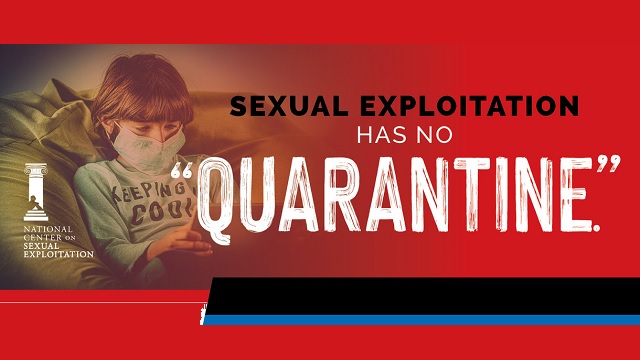How to Fight for Child Safety Online at the Federal Level Right Now

Suppose an online technology platform’s lack of safety features and irresponsible policies allowed a sexual predator to have access to your child in order to sexually abuse and exploit them. In this tragic scenario, you can’t bring a civil lawsuit against that online technology platform because Section 230 of the Communications Decency Act prevents them from being held liable in any way.
It’s why a company like Pornhub is protected from being hit by a civil lawsuit after it came to light that dozens of videos featuring the rape of a 15-year-old sex trafficking victim were being hosted publicly on its site. It’s why companies like Instagram, Snapchat, and TikTok (among others) aren’t being slammed with civil lawsuits even though sexual predators are able to get direct access to minors via technology platforms that lack appropriate safety features. It’s why Facebook isn’t concerned about legal repercussions stemming from the fact that a National Center for Missing and Exploited Children (NCMEC) investigation found 9x more instances of child sexual exploitation on its platform than Facebook itself reported finding.
The National Center on Sexual Exploitation is continuing our policy work on these issues, calling for Congress and local governments to include online safety in any legislation and announcements during this difficult period.
We’ve endorsed and actually helped to shape the EARN IT bill in the U.S. Congress that has great potential to provide online safety for children like Leo.
Because of the carte blanche legal immunity that Section 230 of the Communications Decency Act currently grants, technology companies have no legal incentive to prevent predators from grooming, recruiting, and trafficking children online. As a result, countless children have fallen victim to child abusers on online platforms with seemingly innocent intentions, like Leo and his wish to chat with friends while playing games online.
The EARN IT Act provides crucial incentives to technology companies by making their current gift of immunity conditional based on a demonstration that they are actively working to prevent online sexual exploitation of minors AND child sexual abuse material. This is a game-changer!
Congress has an overriding interest in protecting the safety of citizens from profound harm and EARN IT offers that much-needed protection in the digital space.
We’re working hard to make sure Congress hears the research that shows the harm, listens to the stories of the children harmed, and acts on this critical piece of legislation soon.
This effort cannot happen without your help. Right now, we’re mobilizing our team, meeting remotely with key officials, and campaigning hard for the EARN IT bill to move forward.
Will you help us in this important effort with a tax-deductible donation of $50, $100, or $500? When you do your gift will be matched dollar for dollar by a generous anonymous donor and will ensure that Congress hears your voice and passes this incredibly important legislation to protect the innocent.
EARN IT has the capability to protect and prevent the online exploitation that is happening every day because it requires the tech companies to put children first! This is especially critical in this time of increased online activity by children across the world.
We know you are passionate about helping keep children safe from the online dangers, especially during this time of increased online activity. You can make a difference today in the lives of our children!
© All rights reserved.


I know the bill sounds nice, but with the public education system pushing soft porn sex ed in the schools exposing kids to explicit material under the guise of “education,” it makes the new child protection laws useless. It’s like putting a fence up on one side of the lawn while the other sides are missing. The cronies can easily walk around and get in. So congress needs to see why the hell DOE put soft porn in the public ed. system–plain and simple.
I’d donate as much as I could but I’m not made of money. All i’ve heard for years was “jobs jobs jobs” but nobody wants to hire. In this society if you’re not a billionaire or a senator’s son there really isn’t much voice to say. Whenever election times come around most people don’t know jack about the people on the ballets except their political affiliation. Vote systems should make it easier for people to see more details about the person running, kind of like those gov tracker sites on every single decision the person made. The argument though is that it can be done per citizen but the lists for who and what is running from local to federal makes it complicated to monitor for the average citizen.